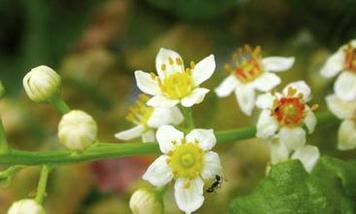
By Wellness Times
If Boswellia can help prevent and treat so many illnesses, why haven’t you ever heard of it?
Actually, you have. Boswellia is the Latin name for frankincense, an herb so valuable it made an appearance in the Christian nativity. Historically, it’s been used as incense and as natural medicine. Its true value, though, is just now being brought to light by research on its unique botanical properties.
Antimicrobial
Boswellia has been shown to have antimicrobial properties, meaning it kills germs on contact. In many cultures, Boswellia is burned to purify the air and used topically for minor skin infections.
Anti-inflammatory
Perhaps the most well-researched activity of Boswellia is its ability to reduce inflammation. Many of the leading causes of death in the United States, including cancer, heart disease, diabetes and Alzheimer’s disease, are linked to chronic inflammation. Some experts theorize that eliminating chronic inflammation would add an average of 10 years to the human life span.
If Boswellia can help prevent and treat so many illnesses, why haven’t you ever heard of it?
Actually, you have. Boswellia is the Latin name for frankincense, an herb so valuable it made an appearance in the Christian nativity. Historically, it’s been used as incense and as natural medicine. Its true value, though, is just now being brought to light by research on its unique botanical properties.
Antimicrobial
Boswellia has been shown to have antimicrobial properties, meaning it kills germs on contact. In many cultures, Boswellia is burned to purify the air and used topically for minor skin infections.
Anti-inflammatory
Perhaps the most well-researched activity of Boswellia is its ability to reduce inflammation. Many of the leading causes of death in the United States, including cancer, heart disease, diabetes and Alzheimer’s disease, are linked to chronic inflammation. Some experts theorize that eliminating chronic inflammation would add an average of 10 years to the human life span.
|
Inflammation occurs as a cascade of events in which several activators of inflammation (called cytokines) are set in motion. Boswellia modulates several cytokine pathways. This is in contrast to over-the-counter and prescription drugs that generally seek to completely disable one or two pathways. Boswellia does not disable pathways; instead, it encourages more moderate expression and assists the inflammatory system in returning to its non-activated state.
|
Perhaps the most interesting aspect of Boswellia’s inflammation modulation is that it is helps to reduce the formation of molecules called leukotrienes that trigger inflammation. This means that people with diseases involving excess leukotriene formation, such as asthma, chronic obstructive pulmonary disease (COPD) and inflammatory bowel disease, may benefit greatly from Boswellia. These effects were outlined in an October 2006 article in Planta Medica.
Boswellia has been studied alone and in combination with another potent anti-inflammatory herb, curcumin, for osteoarthritis. In a September 2011 study published in Osteoarthritis and Cartilage, Boswellia and curcumin were compared to the prescription arthritis drug celecoxib (one brand name is Celebrex) in individuals with osteoarthritis. The herb combination provided better pain relief and distance walked without pain, and equaled the drug for improving joint flexibility.
Boswellia has been studied alone and in combination with another potent anti-inflammatory herb, curcumin, for osteoarthritis. In a September 2011 study published in Osteoarthritis and Cartilage, Boswellia and curcumin were compared to the prescription arthritis drug celecoxib (one brand name is Celebrex) in individuals with osteoarthritis. The herb combination provided better pain relief and distance walked without pain, and equaled the drug for improving joint flexibility.
|
Boswellia has also been shown in preliminary research to be effective at reducing swelling around brain tumors, most recently in an August 2011 study published in Cancer.
Activates genetic expression Research has shown that age and environment can cause certain genes in the body to go to “sleep.” Some of these genes direct the body to suppress tumors (cancer). That is why cancer risk increases with age—some of the body’s defense mechanisms are inactive. One group of researchers from Baylor University presented a study at the International Meeting of the American Gastroenterological Association in May of 2011 demonstrating that Boswellia “wakes up” these sleeping genes. |
Supplementing with Boswellia
Boswellia has a long history of safe use. However, it turns out there are pro-inflammatory compounds in Boswellia that actually decrease its overall potency. These compounds are called beta boswellic acids, or BBA. In fact, there is early research, including a 2005 study published in the British Journal of Pharmacology, suggesting excessive BBAs may be unhealthy for the heart and lungs.
High-quality Boswellia is purified, with BBA reduced to less than 5 percent for optimal effectiveness. Also, the product should be standardized to at least 10 percent AKBA; unstandardized Boswellia can have as little as 1 percent of this very important compound. Choose a manufacturer with a good reputation for quality and effectiveness.
Scientific Studies Support Using Boswellia
A study performed in 2004 shows that Boswellia is an herb that lives up to its reputation. In Switzerland 24 dogs with chronic joint pain were administered a dose of boswellia once a week for 6 weeks. After just a couple weeks 71 percent of the dogs showed improvement. The researchers noted that improvement was gradual but boswellia did seem to help reduce local pain and stiff gaits. Dog owners should be wary of supplements not backed by research, but Boswellia is one herb that seems to work.
Boswellia has a long history of safe use. However, it turns out there are pro-inflammatory compounds in Boswellia that actually decrease its overall potency. These compounds are called beta boswellic acids, or BBA. In fact, there is early research, including a 2005 study published in the British Journal of Pharmacology, suggesting excessive BBAs may be unhealthy for the heart and lungs.
High-quality Boswellia is purified, with BBA reduced to less than 5 percent for optimal effectiveness. Also, the product should be standardized to at least 10 percent AKBA; unstandardized Boswellia can have as little as 1 percent of this very important compound. Choose a manufacturer with a good reputation for quality and effectiveness.
Scientific Studies Support Using Boswellia
A study performed in 2004 shows that Boswellia is an herb that lives up to its reputation. In Switzerland 24 dogs with chronic joint pain were administered a dose of boswellia once a week for 6 weeks. After just a couple weeks 71 percent of the dogs showed improvement. The researchers noted that improvement was gradual but boswellia did seem to help reduce local pain and stiff gaits. Dog owners should be wary of supplements not backed by research, but Boswellia is one herb that seems to work.
Boswellia Dosage for Dogs
The Boswellia dosage for a Chihuahua is very different from the dosage for a Great Dane. How much Boswellia a dog should take is determined mainly by the dog's size. As a general rule 10-20mg of Boswellia should be administered for every kilogram the dog weighs. The herb should be served with a normal portion of dog food. In the study mentioned earlier veterinarians administered 400mg of Boswellia extract for every 10 kilograms the dog weighed, once a day.
Before Using Boswellia
Although Boswellia is reported to be a safe supplement with no dangerous side effects it is a good idea to tell your vet about any supplements you are using. Every dog is different and the holistic vet may know of a more effective treatment or a reason Boswellia is not right for your dog. Also be sure to ask if Boswellia would interfere with any other medications your dog is taking. Consult with a holistic vet for best advice on using herbs.
The Boswellia dosage for a Chihuahua is very different from the dosage for a Great Dane. How much Boswellia a dog should take is determined mainly by the dog's size. As a general rule 10-20mg of Boswellia should be administered for every kilogram the dog weighs. The herb should be served with a normal portion of dog food. In the study mentioned earlier veterinarians administered 400mg of Boswellia extract for every 10 kilograms the dog weighed, once a day.
Before Using Boswellia
Although Boswellia is reported to be a safe supplement with no dangerous side effects it is a good idea to tell your vet about any supplements you are using. Every dog is different and the holistic vet may know of a more effective treatment or a reason Boswellia is not right for your dog. Also be sure to ask if Boswellia would interfere with any other medications your dog is taking. Consult with a holistic vet for best advice on using herbs.
















